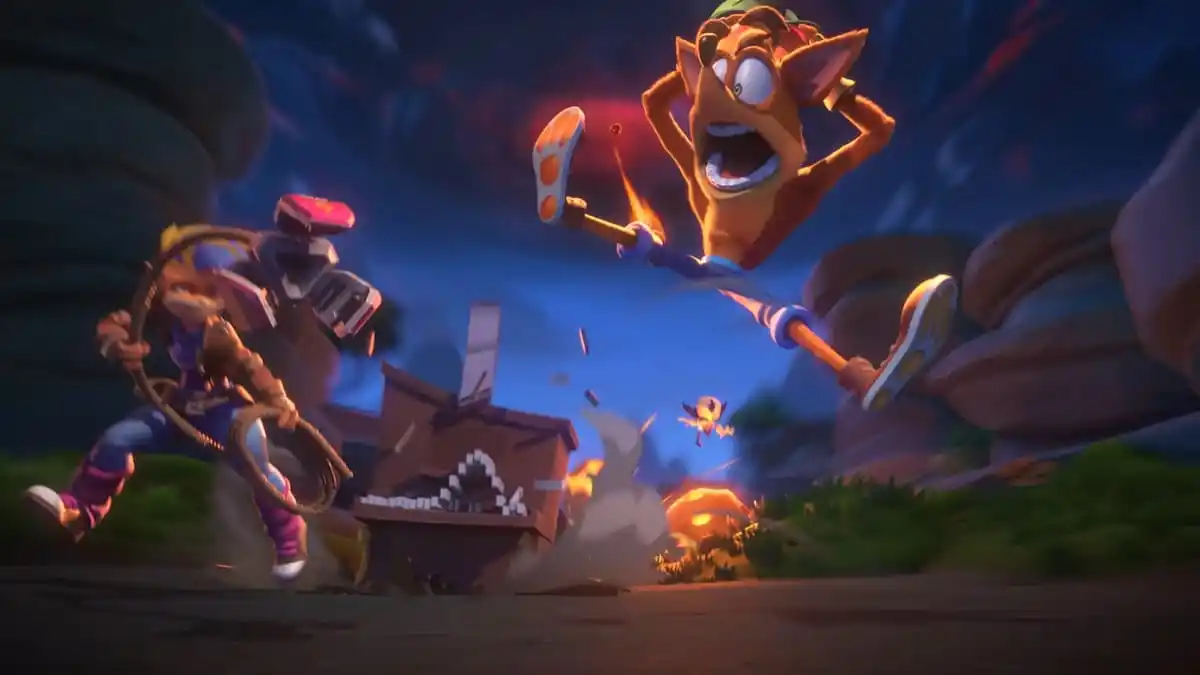Whoa?
Another live service game just came out in 2023 in Crash Team Rumble, and we’re getting it instead of a Crash 5 for now. Wait, come back! If you’re a Crash fan, there might be something here for you. Yeah, I didn’t expect it either.
Crash Team Rumble (PS4, PS5 [reviewed], Xbox One, Xbox Series X/S)
Developer: Toys for Bob
Publisher: Activision
Released: June 20, 2023
MSRP: $29.99 (standard), $39.99 (deluxe)
So what the heck is Crash Team Rumble?
Despite the weird and somewhat pointless monetization angle (which we’ll get to), the standard $29.99 edition (yes, this is not free-to-play) is a much simpler package than it seems on the surface. Crash Team Rumble is a 4v4 battle game that asks two competing teams to dunk Wumpa Fruit into their goal until they hit a score limit: at which point that team immediately wins. Easy to parse, right? It actually is! Matches are around five minutes to boot.
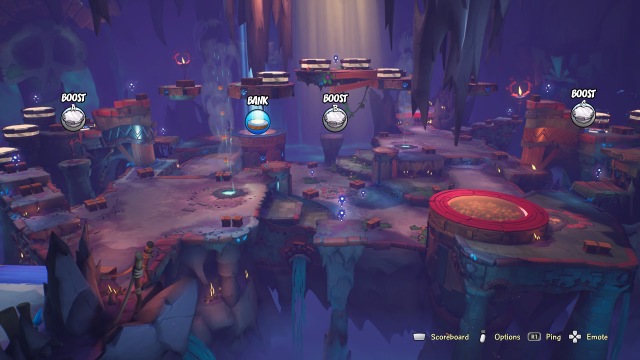
You’ll need to roam across nine different maps (with more to come) that feel a lot like miniature Crash Bandicoot platforming levels while grabbing fruit, stopping other players from scoring, and causing havoc with power-ups. Those three core game loops encapsulate the trio of codified roles in the game: scorer, blocker, and booster. Actually fulfilling the core duties of your role (which is linked to specific characters) will shorten your ability cooldowns, but it’s not completely necessary; as I’ve been in plenty of games where players flex into different jobs on a constant basis (and thrive).
The secret sauce of Crash Team Rumble is how all of this plays out. Given how easy this game is to pick up and put down, I was shocked to look up at the clock and see that an hour went by during multiple sessions.
Breezy, fun, and cute mayhem
Crash Team Rumble controls a lot like a legitimate core Crash game, which is where it’s going to make its mark for fans.
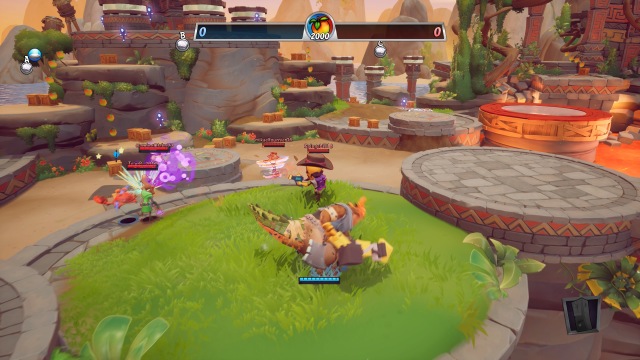
Crash himself still double-jumps, spins, and belly flops as normal, and each other character is different enough to justify their inclusion while mixing up how you approach each match. Platforming skills are paramount too, as swift jumps and air dashes can mean the difference between losing all of your fruit to a pit or scoring a game-winning goal. Coco in particular became a favorite of mine, as she can drop a digital brick wall behind her, with the option to trigger it during an air dash. It’s immensely satisfying to block out an enemy while getting away for a breather, or drop them while mid-air to cause an opponent to slam into them and fall into the depths below.
I love how seamlessly Team Rumble eases you into all of this. The tutorial is short and sweet, and it’s painless to pick up characters as there’s a detailed move menu, just like a fighting game. What really surprised me is the high penchant for heroics in Crash Team Rumble‘s minute-to-minute flow. I’ve seen plenty of matches where individual players can make the difference in a marked way, cleaning up an entire team or blowing a crucial cooldown to defend a base when the enemy has the fruit they need to dunk and win. Hazards and other objectives (like taking control of extra score boost platforms or grabbing neutral power-ups) mix things up constantly, where no individual match feels the same, as different things are popping at different times and different roles of different skill levels are crossing paths.
The maps are just big enough to encourage discovery and small enough to create conflict: and the in-game iconography can help you make split-second decisions, like holding a large cache of fruit until the moment another teammate captures a bonus objective, to dunk in some extra points.
To reiterate the looseness of the role system gimmick, you aren’t fully “locked” into being a scorer, blocker, or booster, but slipping into that role will make things a little smoother. Scorers want to actually score. Blockers block other scorers, naturally. Boosters want to manipulate the match using those aforementioned activities, providing power-ups for the team and locking down scoring bonuses. Shorter cooldowns through role performance mean more opportunities for bigger plays, but you can make those plays organically.
All of this action funnels into one core mode (competitive matchmaking), with the option for private matches and “practice” featuring bots. This ensures there’s one major “pool” for everyone to funnel into, and the aforementioned loop allows for a lot of variety. It’s kind of a genius way to handle an online competitive game.
Thankfully, Crash Team Rumble has cross-play on day one. For a game like this, it basically needs cross-play to survive more than six months. Even so, I’m still worried about this one just from a preservation angle. A bot mode is a decent addition, but it is ostensibly a live service game, and I don’t magically expect it’ll become more generous as time goes on.
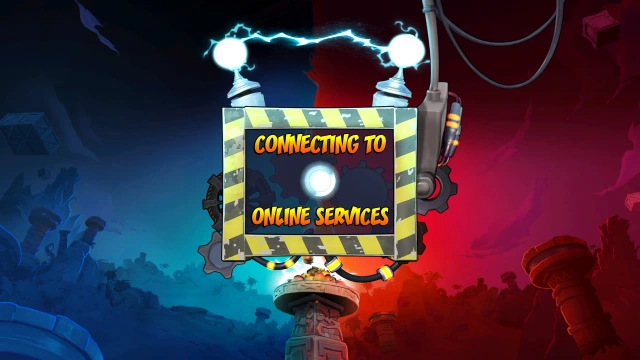
Thankfully, Crash Team Rumble has cross-play on day one. For a game like this, it basically needs cross-play to survive more than six months. Even so, I’m still worried about this one just from a preservation angle. A bot mode is a decent addition, but it is ostensibly a live service game, and I don’t magically expect it’ll become more generous as time goes on.
What about those live service elements?
Outside of the 20 seconds or so it takes to connect to the game after the intro, it’s hard to even sniff out some of the live service portions of Crash Team Rumble. This is partly due to the fact that the base game (again, $29.99) comes with the premium pass for season 1, while the deluxe edition includes seasons 1 and 2. Those passes are standard fare, containing emotes, backpacks, skins, and so on for each character…so a Fortnite lite style pass. The progression is what I’d call “slow-ish,” which makes it feel all the more pointless; but individual character progression is kind of neat, as you can level up each cast member and unlock more cosmetics on top of the pass.
Even so, the slow-going pass is antithetical to the casual nature of how matches flow, and it’s simultaneously confusing and innocuous. Those elements can feel tacked on, and although future seasonal content updates and monetization is up in the air (Activision is notorious for adding more layers after the launch of several similar games), all the core content (read: characters) is tied to in-game challenges, even future characters.
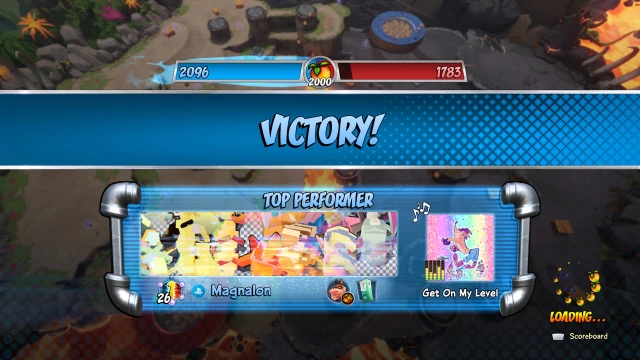
It’s a bold move to go with a premium package on top of a season pass model with a smaller release like this, but that’s what we have at the moment. It’s hard to predict how Crash Team Rumble ends up in six months, but I hope it’s still around, and the team is able to just facilitate what is working without corporate meddling. Whether or not enough people feel like spending $30 minimum to stick around and find out is up in the air.
